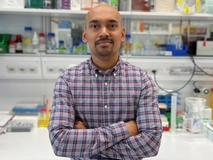Startups revolutionizing the polymer foam industry, introducing a new plant-based taste experience, developing novel immunosuppressive compounds, and developing a clinical trial platform for telemedecine each win CHF 10,000
16.06.2021
Groam, Luya, NextImmune, and Skyvor Medical win Venture Kick's first financial and entrepreneurial support stage. Their projects thrive to revolutionize the polymer foam industry by introducing sustainable foam solutions applicable across sectors, offer a flavor-loaded plant-based alternative to meat that doesn’t try to be meat, hold the potential to minimize the side effects while effectively suppressing alloimmune and autoimmune responses, and propose an end-to-end clinical trial platform to allow patients to participate in trials from the comfort of their homes.
 |
 Groam: Zuzana Sediva and Sophie Grimm
|
 Luya Foods Co-founders: Flavio Hagenbuch, Michael Alistair Whyte, Christoph Denkel, and Tobias Kistler
|
 NextImmune’s co-founder and Chief Science Officer, Rajesh Jayachandran
|
 Skyvor Team
|
Groam: Revolutionizing the polymer foam industry
The polymer foam market is huge and estimated at USD 114 B. Within this market shoe midsole materials and foam, packaging are each also estimated at around USD 20 B. Polymer foam is contributing to the plastic pollution problem. Fossil-fuel-based plastic resins are mixed with harmful blowing agents or cross-linked foam. Bio-based polymers - based on plants - and compostable solutions are emerging. Yet still, these solutions are mostly three times more expensive, with low performance, lacking especially flexibility and resilience, or lacking an end to life.
Dr. Zuzana Sediva - currently the only founder of Groam and pioneer fellow at ETH Zurich, Sophie Grimm, an ETH Zurich graduate with material and food science background and strong entrepreneurial drive, supported by Prof. Erich Windhab on the scientific side and Michael Stucky on the business side are working together to address these issues. At Groam, they thrive to revolutionize the polymer foam industry by introducing sustainable foam solutions applicable across sectors. They design foams with an end2life cycle stepping away from linear mass production of virgin material often ending up in landfills. The startup has two product lines, which they want to sell environmentally driven brands. One product line is biodegradable and one bio-based, both containing valorized waste streams from the agricultural industry. Groam combines raw materials and waste streams with their patented foaming technology achieving environmentally friendly foams. Currently, their focus is on home compostable packaging for higher added value goods like electronics or jewelry, sectors in which they foresee fast commercial impact.
They will use the Venture Kick funds for external trials, raw materials, and external analytics. The next step is to validate the standing technology with two model materials containing waste biomass streams. They also plan to do external analytics on biodegradability and product performance.
Dr. Zuzana Sediva - currently the only founder of Groam and pioneer fellow at ETH Zurich, Sophie Grimm, an ETH Zurich graduate with material and food science background and strong entrepreneurial drive, supported by Prof. Erich Windhab on the scientific side and Michael Stucky on the business side are working together to address these issues. At Groam, they thrive to revolutionize the polymer foam industry by introducing sustainable foam solutions applicable across sectors. They design foams with an end2life cycle stepping away from linear mass production of virgin material often ending up in landfills. The startup has two product lines, which they want to sell environmentally driven brands. One product line is biodegradable and one bio-based, both containing valorized waste streams from the agricultural industry. Groam combines raw materials and waste streams with their patented foaming technology achieving environmentally friendly foams. Currently, their focus is on home compostable packaging for higher added value goods like electronics or jewelry, sectors in which they foresee fast commercial impact.
They will use the Venture Kick funds for external trials, raw materials, and external analytics. The next step is to validate the standing technology with two model materials containing waste biomass streams. They also plan to do external analytics on biodegradability and product performance.
Luya: Introducing a new plant-based taste experience
On one hand, consumer demand for new plant-based products is strongly growing, mostly driven by well-known meat alternatives, though often comprising many ingredients and requiring expensive, heavily refined protein isolates. On the other hand, in Switzerland alone >950,000 t/a of readily available, valuable food by-products remain un-used in the food industry. Luya's technology enables them to use such by-products to provide consumers with a new generation of tasty textured products, like meat alternatives, with a leading sustainability record and strong nutritional profile.
Dr. Christoph Denkel, PhD in Food Process Engineering, Flavio Hagenbuch, M.Sc. in Finance, Tobias Kistler, M.Sc. Food Process Engineering, Michael Whyte, M.Sc. Food, Nutrition, and Health are Luya's team of chefs, food technologists, and food lovers. Luya is the flavor-loaded plant-based alternative to meat that doesn’t try to be meat. They rescue organic okara - a by-product of tofu and soy milk production of which more than 14 million tonnes go to waste globally every year - and turn it into ready-to-cook slices, chunks and patties. Using traditional fermentation methods and modern technology, they can skip all the additives and highly processed ingredients, and offer 100% natural, organic deliciousness made in Switzerland. The Swiss meat alternatives market is growing strongly by +25% sales p.a. 2014-19 and is expected to continue to claim market share from the traditional meat market. On a global scale, the alternative protein market is expected to reach USD 140 billion by 2029 according to Barclays Research in 2019.
The Venture Kick Stage 1 funds will be routed into brand, design, and packaging development. enjoyluya.com
NextImmune: Developing novel immunosuppressive compounds for autoimmune diseases and transplant rejection
Currently available immunosuppressants for the treatment of autoimmune-inflammatory disorders, organ rejection following transplantation and Graft versus Host Disease (GvHD) carry a high risk for side effects and toxicity (opportunistic infections, development of cancer, renal, hepatic and cardiotoxicity).
NextImmune aims to circumvent these issues with the generation of a first-in-class compounds targeting a recently discovered T cell activation pathway that holds the potential to minimize the above-mentioned side effects while effectively suppressing alloimmune and autoimmune responses.
The Venture Kick funds will be used with the objective of preclinical development of the lead compound and validation in preclinical disease models.
Skyvor Medical: End-to-end clinical trial platform for telemedicine
For pharma companies, the most time- and cost-consuming part of developing drugs lies within clinical trials. ‘Decentralized’ trials, a new type of clinical study in which patients participate in the trials from the comfort of their own home, are gaining traction, particularly as a result of the COVID-19 pandemic. For clinical trials to be truly decentralized, wearables, home-use medical devices, telecommunications, and digital biomarkers not only need to be effective but also need to work together to give maximum impact. However, as of current, there are few devices and biomarkers that are compatible with remote trial settings, and importantly, there are no software solutions that can seamlessly integrate and manage all these moving parts.
To address this pain point, Skyvor Medical proposes an end-to-end clinical trial platform that facilitates the operation of decentralized clinical trials. The platform will integrate medical devices, digital endpoints, home blood tests, mobile APPs, and advanced analytics in a continuous manner. The Skyvor team has strong expertise in the development and will collaborate with the University Hospital Basel to validate their solution. Skyvor Medical is lead by Dr. Linus Kao, a senior digital health expert at Novartis with over 15 years of experience in product development of in vitro diagnostics, medical decides, and enterprise digital solutions. Complementing Linus are Carolyn Chen, a global clinical trial manager with 10+ years leading large-scale clinical trials at pharma giants including Novartis, GSK, and Sanofi, software developer Dr. Hsin-Fang Hsu, life sciences funding and business consultant Dr. Ming Wang, data analytics expert Fabian Wu, and experienced PE/VC and start-up board member Chan-Yuan Lu.
Regarding market potential, the global market for decentralized clinical trials is currently valued at USD 7.4 billion and is estimated to grow at a CAGR of 5.7% between 2021-2028. Market growth is driven by the rise in R&D activities, a move towards digitization in healthcare, and the increasing adoption of telemedicine solutions. Additional drivers include increasing alliances between pharma companies and contract research organizations, as well as government initiatives to support health digitalization.
The Skyvor team plans to use the VentureKick funds to develop their business plan, perform a feasibility study (detailed market research, consultation with KOLs), develop their financial and business models, and refine their IP strategy.
NextImmune: Developing novel immunosuppressive compounds for autoimmune diseases and transplant rejection
Currently available immunosuppressants for the treatment of autoimmune-inflammatory disorders, organ rejection following transplantation and Graft versus Host Disease (GvHD) carry a high risk for side effects and toxicity (opportunistic infections, development of cancer, renal, hepatic and cardiotoxicity).
NextImmune aims to circumvent these issues with the generation of a first-in-class compounds targeting a recently discovered T cell activation pathway that holds the potential to minimize the above-mentioned side effects while effectively suppressing alloimmune and autoimmune responses.
The Venture Kick funds will be used with the objective of preclinical development of the lead compound and validation in preclinical disease models.
Skyvor Medical: End-to-end clinical trial platform for telemedicine
For pharma companies, the most time- and cost-consuming part of developing drugs lies within clinical trials. ‘Decentralized’ trials, a new type of clinical study in which patients participate in the trials from the comfort of their own home, are gaining traction, particularly as a result of the COVID-19 pandemic. For clinical trials to be truly decentralized, wearables, home-use medical devices, telecommunications, and digital biomarkers not only need to be effective but also need to work together to give maximum impact. However, as of current, there are few devices and biomarkers that are compatible with remote trial settings, and importantly, there are no software solutions that can seamlessly integrate and manage all these moving parts.
To address this pain point, Skyvor Medical proposes an end-to-end clinical trial platform that facilitates the operation of decentralized clinical trials. The platform will integrate medical devices, digital endpoints, home blood tests, mobile APPs, and advanced analytics in a continuous manner. The Skyvor team has strong expertise in the development and will collaborate with the University Hospital Basel to validate their solution. Skyvor Medical is lead by Dr. Linus Kao, a senior digital health expert at Novartis with over 15 years of experience in product development of in vitro diagnostics, medical decides, and enterprise digital solutions. Complementing Linus are Carolyn Chen, a global clinical trial manager with 10+ years leading large-scale clinical trials at pharma giants including Novartis, GSK, and Sanofi, software developer Dr. Hsin-Fang Hsu, life sciences funding and business consultant Dr. Ming Wang, data analytics expert Fabian Wu, and experienced PE/VC and start-up board member Chan-Yuan Lu.
Regarding market potential, the global market for decentralized clinical trials is currently valued at USD 7.4 billion and is estimated to grow at a CAGR of 5.7% between 2021-2028. Market growth is driven by the rise in R&D activities, a move towards digitization in healthcare, and the increasing adoption of telemedicine solutions. Additional drivers include increasing alliances between pharma companies and contract research organizations, as well as government initiatives to support health digitalization.
The Skyvor team plans to use the VentureKick funds to develop their business plan, perform a feasibility study (detailed market research, consultation with KOLs), develop their financial and business models, and refine their IP strategy.


